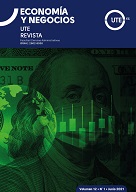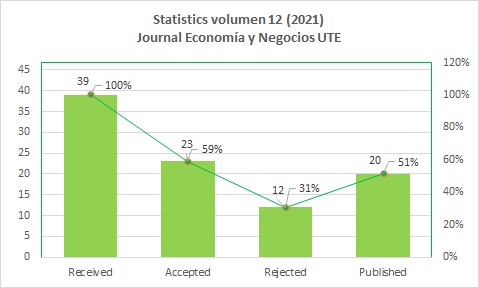Variables Determinantes de la Gestión Logística en la Micro y Pequeña Empresa
DOI:
https://doi.org/10.29019/eyn.v13i1.1039Palabras clave:
Gestión logística, Micro y pequeñas empresas, Medianas y grandes empresasResumen
La presente investigación tiene como objetivo identificar las diferencias y similitudes que pueden existir entre las variables asociadas a la gestión logística de las organizaciones empresariales en función de su tamaño. Para ello, se realizó una comparación entre 992 empresas del Ecuador en la que se representaron cuatro tipos de empresas: micro, pequeña, mediana y grande, en proporción a la estructura que presenta la composición de las empresas del país. Los resultados mostraron, mediante la aplicación de una prueba de hipótesis para verificar la igualdad de medias, la existencia de diferencias estadísticamente significativas en los niveles de análisis en variables asociadas a funciones administrativas, procesos de abastecimiento, almacenamiento, producción, distribución y logística inversa. Se demostró que el grado de desarrollo de la actividad logística es muy limitado en las micro y pequeñas empresas, por lo tanto, el cuerpo de conocimientos e instrumentos metodológicos disponibles para la administración de empresas debe adaptarse con cautela al aplicarlos en el contexto de organizaciones pequeñas.
Descargas
Citas
Alzate Rendón, I.C. and Boada, A.J. (2017). Solutions Route for Inventory Management of SMEs from the Retail Sector that Commercialize High Volumen Products Aiming to Support their Sales Growth. Espacios, 38(53).
Arifeen, S.R. (2019). Icepac Limited: Strategic Growth Choices for an SME in the Frozen Food Industry. Asian Journal of Management Cases, 6(1), 86-99. https://doi.org/10.1177/0972820119825980
Barrett, R. and Mayson, S. (2006). Exploring the Intersection of HRM and Entrepreneurship Guest Editors' Introduction to the Special Edition on HRM and Entrepreneurship. Human Resource Management Review, 16(2006), 443-446.
Boonlua, S. (2019). Learning and Growth for Sustainable Development of Logistics Companies in Thailand. Polish Journal of Management Studies, 20(1), 92-102. https://doi.org/10.17512/pjms.2019.20.1.08
Campo Ruiz, M. (8-10 July 2006). La participación en las empresas como herramienta de gestión: revisión de la literature. Proceeding of 13th Conference of the international Association for the Economics of Participation. Oñate.
Chan, E.S., Okumus, F., and Chan, W. (2018). Barriers to Environmental Technology Adoption in Hotels. Journal of Hospitality & Tourism Research, 42(5), 829-852.
Chowdhury, A.H., Alam, M.Z. and Habib, M.M. (2017). Supply Chain Management Practices in Services Industry: An Empirical Investigation on Some Selected Services Sector of Bangladesh. International Journal of Supply Chain Management, 6(3), 152-162.
Chromčáková, A., Klepek, M., and Starzyczná, H. (2018). The Measurement Methods of Customer Value and its Use in Small and Medium Sized Czech Enterprises. Scientific Papers of the University of Pardubice, Series D: Faculty of Economics and Administration, 26(43), 87-99.
Dallasega, P., Woschank, M., Ramingwong, S., Tippayawong, KY. and Chonsawat, N. (5-7 March 2019). Field Study to Identify Requirements for Smart Logistics of European, US and Asian SMEs. Proceedings of the International Conference on Industrial Engineering and Operations Management. Bangkok, Thailand.
De Oliveira Neto, G.C., Filho, M.G., Gonçalves, M.A., Costa, B.K., Da Silva, D., and Amorim, M.P.C. (2018). Framework Built on Resource-Based View for Outsourcing Strategy on Hiring Logistics Service Provider. Gestao e Producao, 25(3), 458-484. https://doi.org/10.1590/0104-530x2016-17
Dincă, V.M., Dima, A.M. and Rozsa, Z. (2019). Determinants of Cloud Computing Adoption by Romanian Smes in the Digital Economy. Journal of Business Economics and Management, 20(4), 798-820. https://doi.org/10.3846/jbem.2019.9856
Divisekera, S. and Nguyen, V.K. (2018). Determinants of innovation in tourism evidence from Australia. Tourism Management, 67, 157-167. https://doi.org/10.1016/j.tourman.2018.01.010
Gélinas, R. and Bigras, Y. (2004). The characteristics and features of SMEs: Favorable or unfavorable to logistics integration? Journal of Small Business Management, 42(3), 263-278. https://doi.org/10.1111/j.1540-627x.2004.00111.x
Gissin, V.I., Mehantseva, K.F. and Surzhikov, M.A. (2019). Indicators and methods for assessing the quality of logistic activity processes. International Journal of Economics and Business Administration, 7, 16-25. https://doi.org/10.35808/ijeba/367
Gružauskas, V., Baskutis, S. and Navickas, V. (2018). Minimizing the Trade-off Between Sustainability and Cost Effective Performance by Using Autonomous Vehicles. Journal of Cleaner Production, 184, 709-717. https://doi.org/10.1016/j.jclepro.2018.02.302
Hernández Mastrapa, L., Pontes de Assumpção, M.R., De Oliveira, M.C. and Tasé Velázquez, D.R. (2020). Apoio à decisão multicritério na priorização de rotas para o transporte urbano. Revista Produção Online, 20(2), 398-421. https://doi.org/10.14488/1676-1901.v20i2.3679
Kačmáry, P., Malindžák, D. and Spišák, J. (2019). The Design of Forecasting System Used for Prediction of Electro-Motion Spare Parts Demands as an Improving Tool for an Enterprise Management. Management Systems in Production Engineering, 27(4), 242-249. https://doi.org/10.1515/mspe-2019-0038
Kazancoglu, Y., Kazancoglu, I. and Sagnak, M. (2018). Fuzzy DEMATEL-Based Green Supply Chain Management Performance: Application in Cement Industry. Industrial Management and Data Systems, 118(2), 412-431. https://doi.org/10.1108/imds-03-2017-0121
Kikawa, C.R., Kalema, B.M. and Carol, M.N. (2019). A Statistical Analysis of Business Intelligence Acceptance by SMEs in the City of Tshwane, Republic of South Africa. Academy of Entrepreneurship Journal, 25(2), 1-19.
Krishnan, T.N. and Hugh, S. (2017). Talent Management and Dynamic View of Talent in Small and Medium Enterprises. Human Resource Management Review.
Love, T.J. and Gilmour, P. (1976). A Logistics Review for the Small Company. MCB Monographs, 1-28.
Murphy, P.R., Daley, J.M. and Knemeyer, A.M. (1999). Comparing Logistics Management in Small Firms: An Exploratory Study. Transportation Journal, 38(4), 18-25.
Mukhopadhyay, S. and Maulik, S.R. (2019). Supply Chain Management in Handloom Sectors. A Review. Journal of the Textile Association, 79(5), 347-357.
Nagitta, O.P. and Mkansi, M. (2019). Exploring the Supply Chain Coordination Dimensions for Artemisinin-Based Combination Therapies in Uganda. International Journal of Supply Chain Management, 8(4), 134-151.
OECD. (2015). Taxation of SMEs in OECD and G20 Countries. OECD tax policy studies no. 23.
Oey, E. and Nofrimurti, M. (2018). Lean Implementation in Traditional Distributor Warehouse. A Case Study in an FMCG Company in Indonesia. International Journal of Process Management and Benchmarking, 8(1), 1-15. https://doi.org/10.1504/ijpmb.2018.088654
Pinheiro, E., de Francisco, A.C., Piekarski, C.M. and de Souza, J.T. (2019). How to Identify Opportunities for Improvement in the Use of Reverse Logistics in Clothing Industries? A Case Study in a Brazilian Cluster. Journal of Cleaner Production, 210, 612-619. https://doi.org/10.1016/j.jclepro.2018.11.024
Piyathanavong, V., Garza-Reyes, J.A., Kumar, V., Maldonado-Guzmán, G. and Mangla, S.K. (2019). The Adoption of Operational Environmental Sustainability Approaches in the Thai Manufacturing Sector. Journal of Cleaner Production, 220, 507-528.
Pongpanit, P. and Sornsaruht, P. (2019). The Critical Nature of Road Logistics Industry Process Capability's Role in Sustainable Tourism Development. African Journal of Hospitality, Tourism and Leisure, 8(5).
Qamar, A. and Hall, M. (2018). Can Lean and Agile Organisations Within the UK Automotive Supply Chain be Distinguished Based Upon Contextual Factors? Supply Chain Management, 23(3), 239-254. https://doi.org/10.1108/scm-05-2017-0185
Salas-Navarro, K., Meza, J.A., Obredor-Baldovino, T. and Mercado-Caruso, N. (2019). Evaluation of the Supply Chain to Improve Competitiveness and Productivity in the Metalworking Industry in Barranquilla, Colombia. Información Tecnológica, 30(2), 25-32.
Shvartsburg, L. and Zaborowski, T. (2019). Edi System in Logistic Management of an Enterprise. Logforum, 15(2), 205-221. https://doi.org/10.17270/j.log.2019.332
Starostka-Patyk, M. and Bajdor, P. (10-11 April 2019). Management of Defective Products by Reverse Logistics Processes in Polish Furniture Industry. 33th IBIMA Conference. Granada, Spain.
Sudarto, S., Takahashi, K., Morikawa, K. and Nagasawa, K. (2016). The Impact of Capacity Planning on Product Lifecycle for Performance on Sustainability Dimensions in Reverse Logistics Social Responsibility. Journal of Cleaner Production, 133, 28-42.
Suriyajaroen, C. and Sopadang, A. (6-8 March 2018). Criteria Affecting the Selection of Logistics Service Provider for Retail Small and Medium Enterprise in Thailand. International Conference on Industrial Engineering and Operations Management. Bandung, Indonesia.
Ueasangkomsate, P. (15-18 December 2019). Exploring Green Logistics Management in Thai Small and Medium-Sized Food Exporters. IEEE International Conference on Industrial Engineering and Engineering Management (IEEM). Macao, Macao.
Zimon, D. and Madzík, P. (2019). Standardized Management Systems and Risk Management in the Supply Chain. International Journal of Quality and Reliability Management, 37(2), 305-327. https://doi.org/10.1108/ijqrm-04-2019-0121
Zimon, D., Madzik, P. and Sroufe, R. (2019). Management Systems and Improving Supply Chain Processes: Perspectives of Focal Companies and Logistics Service Providers. International Journal of Retail and Distribution Management, 48(9), 939-961. https://doi.org/10.1108/ijrdm-04-2019-0107
Zulkiffli, S.N.A, Sebadak, M., Padlee, S.F. and Yusoff, J.M. (2019). A Literature Review of Innovation Capabilities and Business Performance of Third-Party Logistics (3PL) Service Providers in Malaysia. International Journal of Supply Chain Management, 8(2), 1018-1023.
Publicado
Cómo citar
Número
Sección
Categorías
Licencia
Derechos de autor 2022 Los Autores

Esta obra está bajo una licencia Creative Commons Reconocimiento 3.0 Unported.
Los artículos e investigaciones publicadas por la Universidad UTE, se realizan en régimen de Acceso Abierto [Open Access] en formato electrónico. Al enviar un artículo a cualquiera de las revistas científicas de la Universidad UTE, el o los autores aceptan estas condiciones.
La UTE aplica la licencia Creative Commons Attribution (CC-BY) a los artículos de sus revistas científicas. En virtud de esta licencia de acceso abierto, como autor usted acuerda que cualquier persona puede reutilizar su artículo en su totalidad o en parte para cualquier propósito, de forma gratuita, incluso para fines comerciales. Cualquiera puede copiar, distribuir o reutilizar el contenido siempre y cuando el autor y la fuente original estén correctamente citados. Esto facilita la libertad de reutilización y también asegura que el contenido pueda ser extraído sin barreras para necesidades de investigación.
Licencia Creative Commons Atribución 4.0 Internacional
La Revista Economía y Negocios está distribuida bajo una
Creative Commons Attribution 4.0 International (CC BY 4.0).

Además, la Revista Economía y Negocios garantiza y declara que los autores conservan siempre todos los derechos de autor y de publicación de sus obras originales sin restricciones [© Los Autores]. El reconocimiento (BY) permite cualquier explotación de la obra, incluyendo una finalidad comercial, así como la creación de obras derivadas, la distribución de las cuales también está permitida sin ninguna restricción.















